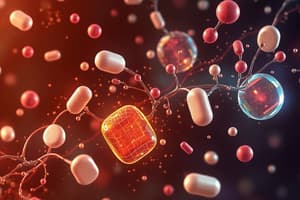Podcast
Questions and Answers
How do thiazides primarily lower blood pressure?
How do thiazides primarily lower blood pressure?
- By increasing extracellular fluid volume
- By decreasing cardiac output (correct)
- By reducing plasma volume
- By enhancing sodium bicarbonate excretion
What was the original focus of Merck Sharpe and Dohme when developing thiazides?
What was the original focus of Merck Sharpe and Dohme when developing thiazides?
- Enhancing sodium bicarbonate excretion
- Enhancing water retention
- Enhancing potassium excretion
- Enhancing sodium excretion with chloride (correct)
What is the primary mechanism of action by which thiazides lower blood pressure?
What is the primary mechanism of action by which thiazides lower blood pressure?
- Vasodilation (correct)
- Enhancing potassium retention
- Volume contraction
- Increasing plasma volume
What is the temporary effect on extracellular fluid volume with chronic use of thiazides?
What is the temporary effect on extracellular fluid volume with chronic use of thiazides?
Which condition are thiazides commonly used for in medical practice?
Which condition are thiazides commonly used for in medical practice?
What is the main effect of thiazides at steady state in terms of blood pressure control?
What is the main effect of thiazides at steady state in terms of blood pressure control?
What is a common side effect associated with thiazides?
What is a common side effect associated with thiazides?
Which electrolyte imbalance is typically associated with hypokalemia in type 2 diabetes due to thiazide use?
Which electrolyte imbalance is typically associated with hypokalemia in type 2 diabetes due to thiazide use?
What have thiazide-like diuretics been found to do more effectively than other thiazide diuretics?
What have thiazide-like diuretics been found to do more effectively than other thiazide diuretics?
Which of the following is a potential long-term effect of chronic thiazide use?
Which of the following is a potential long-term effect of chronic thiazide use?
What is a known effect of thiazides on urate clearance?
What is a known effect of thiazides on urate clearance?
Why are further research and studies needed regarding thiazides?
Why are further research and studies needed regarding thiazides?
Flashcards are hidden until you start studying
Study Notes
Thiazides: A Class of Diuretics with a Complex History and Role in Blood Pressure Management
Thiazides are a class of diuretics that have been used for decades to treat hypertension and other medical conditions. They work by increasing the excretion of sodium, chloride, and water, which in turn helps to lower blood pressure. The development of thiazides can be traced back to the 1950s when chemists and physiologists at Merck Sharpe and Dohme were seeking to discover drugs that enhance the excretion of sodium with chloride, rather than sodium bicarbonate.
Mechanisms of Action
Thiazide diuretics were initially thought to reduce blood pressure by increasing extracellular fluid (ECF) volume and plasma volume. However, their primary effect is actually vasodilation, which occurs through several mechanisms:
- Decreased cardiac output: Thiazides reduce cardiac output acutely by reducing ECF and plasma volume.
- Vasodilation: At steady state, thiazides primarily cause vasodilation rather than volume contraction.
Although these drugs initially cause ECF volume depletion, this effect is temporary, and plasma volume returns to baseline during chronic use.
Clinical Use
Thiazides are commonly used in the management of hypertension and have been shown to improve blood pressure control in various patient populations. In type 2 diabetic nephropathy patients with albuminuria and creatinine clearance of more than 51 mL/min, thiazides have been found to reduce albuminuria and preserve renal function. However, their long-term effects on proteinuria reduction and preservation of renal function are unclear due to the short-term nature of many studies.
Thiazides have also been shown to reduce cardiovascular risk in hypertensive patients. An analysis of 19 studies including 112,113 patients found that thiazide-like diuretics (chlorthalidone and metolazone) reduce cardiovascular risk more effectively than other thiazide diuretics.
Side Effects
Thiazides are associated with several side effects, including:
- Hypokalemia: A significant dose-dependent decline of serum potassium has been consistently reported with all thiazides.
- Hypomagnesemia: Foglia and colleagues reported that hypokalemia in type 2 diabetes is typically associated with profound hypomagnesemia.
- Hyponatremia: Thiazides have been found to increase the risk for electrolyte disturbances, mainly hypokalemia.
- Hypercalcemia and hyperchloremic alkalosis: Thiazides can cause these electrolyte imbalances, which may be more common when these drugs are administered in high doses or in monotherapy.
- Hyperglycemia and hyperuricemia: Chronic thiazide use may lead to an excess of 3-4% of new cases of diabetes compared with non-users. Thiazides decrease urate clearance and increase serum urate levels in a dose-dependent manner.
Conclusion
Thiazides have a complex history in the treatment of hypertension due to their dual mechanisms of action and associated side effects. Despite their potential risks, thiazides remain an important tool in the management of hypertension and other medical conditions. Further research is needed to better understand their long-term effects on renal function and cardiovascular risk reduction.
Studying That Suits You
Use AI to generate personalized quizzes and flashcards to suit your learning preferences.




